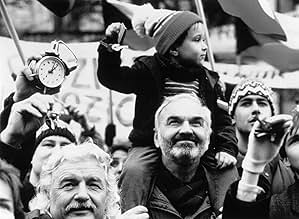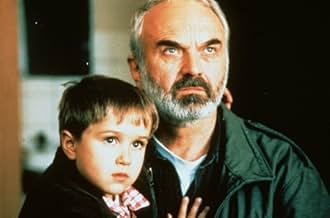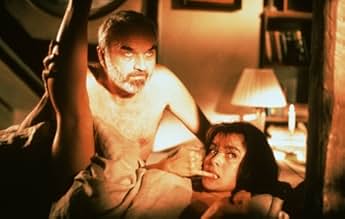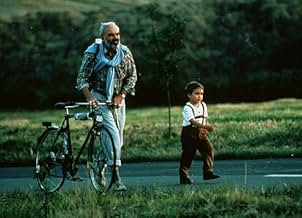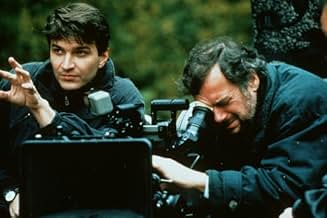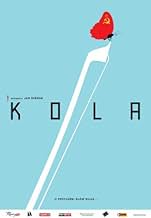NOTE IMDb
7,7/10
17 k
MA NOTE
Un célibataire endurci a la surprise de sa vie lorsqu'un plan d'enrichissement rapide se retourne contre lui et le laisse avec un nouveau colocataire de la taille d'un pingouin.Un célibataire endurci a la surprise de sa vie lorsqu'un plan d'enrichissement rapide se retourne contre lui et le laisse avec un nouveau colocataire de la taille d'un pingouin.Un célibataire endurci a la surprise de sa vie lorsqu'un plan d'enrichissement rapide se retourne contre lui et le laisse avec un nouveau colocataire de la taille d'un pingouin.
- Réalisation
- Scénario
- Casting principal
- Récompensé par 1 Oscar
- 21 victoires et 14 nominations au total
Zdenek Sverák
- Louka
- (as Zdeněk Svěrák)
Andrey Khalimon
- Kolja
- (as Andrej Chalimon)
Irina Bezrukova
- Nadezda
- (as Irina Livanova)
Liliyan Malkina
- Tamara
- (as Lilian Malkina)
Nela Boudová
- Brozová
- (as Nella Boudová)
Avis à la une
8=G=
"Kolya", an award winning Czech film set in Prague, is a sweet and sentimental story about a boy (the title character) and a male cellist who, through circumstance, becomes his guardian. Set against a backdrop of Czech countryside and the architecture of Prague, this well crafted and wistful tale is a worthwhile 100 minute watch for those in need of relief from the numbing excesses of Hollywood blockbusters. Potentially enjoyable by all, "Kolya" will be most appreciated by mature audiences, particularly those who favor European films.
Who knows what you will do when your back is against the wall? Survival makes you do some things that you would never try. In this case Louka (Zdenek Sverák), a confirmed bachelor, marries a Russian woman to get her Czech papers and to get him some money to buy a car and fix his house and pay some debts.
As soon as they marry, she heads to Germany. her son, Kolja (Andrei Chalimon), a little five-year-old, ends up with Louka, who soon finds that he is bonding with the boy.
It is a beautifully touching story with some outstanding performances by the two leads and Libuse Safránková as Klara.
It is fascinating that star and writer of the screenplay is also the father of the director. I cannot imagine how that worker, but I bet it was interesting at times.
As soon as they marry, she heads to Germany. her son, Kolja (Andrei Chalimon), a little five-year-old, ends up with Louka, who soon finds that he is bonding with the boy.
It is a beautifully touching story with some outstanding performances by the two leads and Libuse Safránková as Klara.
It is fascinating that star and writer of the screenplay is also the father of the director. I cannot imagine how that worker, but I bet it was interesting at times.
Take the old formula of two mismatched people being forced to live together, and rejuvenate it by losing the cliches and adding excellent script and direction, and utterly superb acting by all the cast, especially the two leads (the grouch and the boy). The characterisations are just spot on.
Whenever I see films like this I end up both very glad to have seen such an outstanding movie, and extremely irritated that practically no-one knows about this gem of a movie, yet films like 'Godzilla' rake in money.
My thanks to all involved with this movie; you have produced a work of art.
Whenever I see films like this I end up both very glad to have seen such an outstanding movie, and extremely irritated that practically no-one knows about this gem of a movie, yet films like 'Godzilla' rake in money.
My thanks to all involved with this movie; you have produced a work of art.
I've seen a number of U.S. movies filmed in Czechoslovakia, but this is the first Czech film I've seen. Seeing this makes me understand how Czechoslovakia could have a fairly booming film industry.
This movie came on on cable network IFC and it first grabbed my attention because I didn't recognize what language the characters were speaking. Within a couple of minutes, however, the movie itself had hooked me, though it's not the type of story I'd usually seek out. Indeed I was late to work and really wanted to get going, but I was unable to tear myself away.
Beyond the great writing, acting, and directing, this film has some truly amazing cinematography. There are occasions where the filmmakers seem to have commanded the universe around them to get these shots. In one scene, the lead character looks up through his car's windshield as he's driving, and in perfect synchronization the reflection of the airliner he was looking at passes across the windshield. Even more amazing was the shot from well up in the air, with the lead characters' car driving up the road, a train going up a track in parallel to them, and a hawk (or eagle?) hovering right in front of the camera and then diving off to the side -- and they got this shot right at "magic hour". In Hollywood CGI surely would have been used to coordinate this ballet of elements.
There were also many shots incorporating wonderfully poetic imagery. One of my favorites was the lead character staring into the reflective doors at the airport which close and reveal him to himself, standing there utterly alone.
One more comment -- another reviewer called the ending "predictable", but I'd have to disagree. I really didn't know where the movie would end up, and in fact it was portrayed so subtly that I had to rewind the final scene to be sure what had happened, and then go back and re-watch a prior scene that contained a seemingly throwaway line that bears on the ending.
This movie came on on cable network IFC and it first grabbed my attention because I didn't recognize what language the characters were speaking. Within a couple of minutes, however, the movie itself had hooked me, though it's not the type of story I'd usually seek out. Indeed I was late to work and really wanted to get going, but I was unable to tear myself away.
Beyond the great writing, acting, and directing, this film has some truly amazing cinematography. There are occasions where the filmmakers seem to have commanded the universe around them to get these shots. In one scene, the lead character looks up through his car's windshield as he's driving, and in perfect synchronization the reflection of the airliner he was looking at passes across the windshield. Even more amazing was the shot from well up in the air, with the lead characters' car driving up the road, a train going up a track in parallel to them, and a hawk (or eagle?) hovering right in front of the camera and then diving off to the side -- and they got this shot right at "magic hour". In Hollywood CGI surely would have been used to coordinate this ballet of elements.
There were also many shots incorporating wonderfully poetic imagery. One of my favorites was the lead character staring into the reflective doors at the airport which close and reveal him to himself, standing there utterly alone.
One more comment -- another reviewer called the ending "predictable", but I'd have to disagree. I really didn't know where the movie would end up, and in fact it was portrayed so subtly that I had to rewind the final scene to be sure what had happened, and then go back and re-watch a prior scene that contained a seemingly throwaway line that bears on the ending.
This is a variation on the theme of an older man whose emotional life is reawakened by his being thrust into unexpected parenting of a young child. Many have complained of the exploitation of such time-worn subject matter, but the worth of "Kolya" lies in the particulars of how its themes are developed. After all there are still good movies made about underdog sports teams prevailing, and even the exact same material (thinking Shakespeare here) can be made fresh through different productions.
The man in question here is Frantisek Louka, the place is the Czech Republic, and the time is 1988 (just prior to the "Velvet Revolution"). Financial constraints tempt Louka to enter into a bargain to marry a Russian woman so she can get Czech citizenship and, it turns out, escape to West Germany to be with her lover. This leaves Louka to care for the child "Kolya." One thing that makes this movie stand out is the quality of the acting by all involved. In particular Andrei Chalimon as the Russian child is very natural and will win your heart as he does Louka's. But it's a slow process.
Another thing that sets this off is the political backdrop. I knew about Russia's occupation of the Czech Republic after World War II and the non-violent overthrow of the Communist government in 1989, but that is about as far as my knowledge went. This movie portrays what it was like to live in that environment in a concrete way that a history book cannot. A lot of little scenes exemplify the underlying tensions, such as Louka's being expected to display both the Czech and Russian flags in his window, Louka's mother refusing to let some Russian soldiers in to wash their hands by lying about her having no water, and Louka's purposeful refusal to learn the Russian language. So, this movie provided a small increment in my knowledge of Czech history and that's better than nothing. How the political situation drives the action makes for a singularly interesting story.
The musical score that contains works by the Czech composers Dvořák, Suk, Fibich, and Smetana adds a special quality.
Don't be turned away from seeing this because it touches on familiar themes; it is a quality film with unique characteristics.
The man in question here is Frantisek Louka, the place is the Czech Republic, and the time is 1988 (just prior to the "Velvet Revolution"). Financial constraints tempt Louka to enter into a bargain to marry a Russian woman so she can get Czech citizenship and, it turns out, escape to West Germany to be with her lover. This leaves Louka to care for the child "Kolya." One thing that makes this movie stand out is the quality of the acting by all involved. In particular Andrei Chalimon as the Russian child is very natural and will win your heart as he does Louka's. But it's a slow process.
Another thing that sets this off is the political backdrop. I knew about Russia's occupation of the Czech Republic after World War II and the non-violent overthrow of the Communist government in 1989, but that is about as far as my knowledge went. This movie portrays what it was like to live in that environment in a concrete way that a history book cannot. A lot of little scenes exemplify the underlying tensions, such as Louka's being expected to display both the Czech and Russian flags in his window, Louka's mother refusing to let some Russian soldiers in to wash their hands by lying about her having no water, and Louka's purposeful refusal to learn the Russian language. So, this movie provided a small increment in my knowledge of Czech history and that's better than nothing. How the political situation drives the action makes for a singularly interesting story.
The musical score that contains works by the Czech composers Dvořák, Suk, Fibich, and Smetana adds a special quality.
Don't be turned away from seeing this because it touches on familiar themes; it is a quality film with unique characteristics.
Le saviez-vous
- AnecdotesThe child actor who plays Kolja, Andrey Khalimon, was not cast until three weeks before filming started.
- GaffesThroughout the movie, many background cars are clearly newer than 1989 models. The film is set in 1989.
- ConnexionsFeatured in 54th Golden Globe Awards (1997)
Meilleurs choix
Connectez-vous pour évaluer et suivre la liste de favoris afin de recevoir des recommandations personnalisées
- How long is Kolya?Alimenté par Alexa
Détails
- Date de sortie
- Pays d’origine
- Site officiel
- Langues
- Aussi connu sous le nom de
- Коля
- Lieux de tournage
- Sociétés de production
- Voir plus de crédits d'entreprise sur IMDbPro
Box-office
- Montant brut aux États-Unis et au Canada
- 5 770 254 $US
- Montant brut mondial
- 5 770 254 $US
- Durée
- 1h 51min(111 min)
- Couleur
- Mixage
- Rapport de forme
- 1.66 : 1
Contribuer à cette page
Suggérer une modification ou ajouter du contenu manquant


